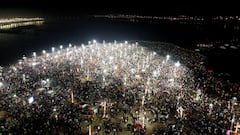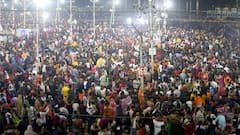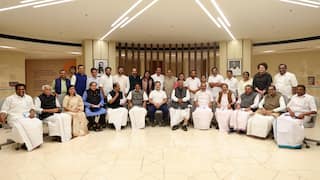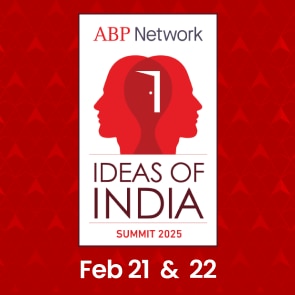Explorer
Bihar Encephalitis Deaths: AES death toll mounts to 129 in Muzaffarpur
With one more death at government-run Sri Krishna Medical College and Hospital (SKMCH) in the intervening night of Saturday-Sunday, the death toll due to Acute Encephalitis Syndrome (AES) mounted to 129 in Muzaffarpur district.

Bihar Encephalitis Deaths: Brain fever - caused by acute encephalitis syndrome (AES) or Japanese encephalitis - scourge is still not under control in Bihar. (PTI)
Bihar Encephalitis Deaths: Brain fever - caused by acute encephalitis syndrome (AES) or Japanese encephalitis - scourge is still not under control in Bihar. More than 140 children have lost their lives in June and over 600 others are reported suffering from AES/Japanese encephalitis. Muzaffarpur is bearing the brunt with over 100 deaths due to brain fever.
According to the Bihar health department, brain fever or Chamki as it is called locally has spread to 16 of 38 districts of the state. With one more death at government-run Sri Krishna Medical College and Hospital (SKMCH) in the intervening night of Saturday-Sunday, the death toll due to Acute Encephalitis Syndrome (AES) mounted to 129 in Muzaffarpur district. As per official data, the death toll in SKMCH has touched 109 while 20 children died at Kejriwal hospital in the district due to the vector-borne disease.
Chief Minister Nitish Kumar had announced an ex-gratia compensation of Rs 4 lakh each to the families of the children who died due to the AES.
He had also given directions to the health department, district administration and doctors to take necessary measures for the containment of the disease.
UP effectively controlled spread of AES: Yogi Adityanath Uttar Pradesh Chief Minister Yogi Adityanath claimed on Saturday that his state got effective results in controlling the spread of Japanese Encephalitis and Acute Encephalitis Syndrome (AES), and described it as a "continuous process" for which sustained efforts would be made. "Many districts in the state were affected by some vector-borne diseases such as encephalitis, dengue, kala azar, malaria, chickungunya, etc. We started programme 'Dastak' in association with UNICEF to control encephalitis and other vector-borne diseases and we got effective results in controlling encephalitis and AES, but it is continuous programme and it will be started again from July 1," he said. His remarks came at a time at least 1349 children died of Acute Encephalitis Syndrome (AES) in neighbouring Bihar. What is Acute Encephalitis Syndrome -- possible causes and symptoms Acute encephalitis syndrome (AES), which has claimed more than 100 lives in Bihar's Muzaffarpur region, is a serious neurological illness that causes inflammation of the brain. Symptoms of AES, colloquially known as "chamki bukhar", may include headache, fever, confusion, stiff neck and vomiting. The disease most commonly affects children and young adults and can lead to mortality. According to the National Health Portal (NHP), viruses are the main causative agents in AES cases, although other sources such as bacteria, fungus, parasites, chemicals, toxins and non-infectious agents have also been blamed. The Japanese encephalitis virus (JEV) is a major cause of AES in India (ranging from 5-35 per cent), according to the NHP. Viruses, including herpes, influenza A, West Nile and dengue, are the some of the other causes of sporadic outbreaks of AES in India, the portal said. However, the causes and manner of the disorder in a large number of AES cases still remain unidentified. "The recent outbreak of encephalitis in Muzaffarpur seems like a viral. However, we are yet to find out what virus it is," Dr Sudip Das, consultant paediatrician, Columbia Asia Hospital, Gurgaon, told PTI. "There are many theories behind it. There is one study that suggests that deaths occurred due to acclimatisation failure in children rather than the environmental factors such as the heat wave and poor rainfall in the area," said Das. According to Dr Manish Mannan, head of department, Paediatrics and Neonatology in Gurgaon's Paras Hospital, there are two competing theories for the epidemic -- one, caused by heat stroke, and two, caused by a toxin in the locally-grown fruit, litchi. "It is said that malnourished children who ate litchis and went to sleep without a meal fell ill in the pre-monsoon season between 4 am to 7 am," Mannan told PTI. "People now know what encephalitis is but the root cause behind it is still unknown. Studies have been conducted across every lab to know the reason behind the near-fatal disease. The encephalitis, which happened in Muzaffarpur, is an outbreak and had happened in the past too," he added. There were more than 44,000 cases and nearly 6,000 deaths from encephalitis in India between 2008 and 2014, said a 2017 study published in The Indian Journal of Medical Research (IJMR). In 2016, over 125 children were reported to have died in one hospital in Gorakhpur in UP alone, researchers wrote in the journal. They said the patients often report acute onset of fever and altered consciousness, with a rapidly deteriorating clinical course, leading to death within hours. Outbreaks of the acute neurological illness with high mortality among children occur annually in Muzaffarpur, the country's largest litchi cultivation region. Heat, humidity, malnourishment, the monsoon and pesticides have all been considered potential causes. A study published in 2017 in The Lancet journal claimed that eating litchi fruit may be associated with acute toxic encephalopathy -- the mysterious brain disease that has caused hundreds of unexplained deaths among children in recent years in Bihar. In the hospital-based surveillance, researchers from the National Centre for Disease Control in New Delhi and the US Centers for Disease Control and Prevention undertook laboratory investigations to assess potential infectious and non-infectious causes of this acute neurological illness. The study found litchi consumption and the absence of an evening meal in the 24 hours preceding illness onset were associated with illness. The absence of an evening meal significantly increased the effect of eating litchis on illness. Tests for infectious agents and pesticides were negative. The possible reason behind the death among children, according to the study, was hypoglycaemia -- low levels of glucose in the blood. These children were from the poorer sections of society where malnourishment is rampant. The children spend the day in orchards eating litchis -- sometimes unripe or half-ripe ones too. The children return home in the evening and sometimes skip dinner. This leads to night-time hypoglycaemia, the researchers wrote in the journal. According to the researchers, lack of food combined with toxins hypoglycin A and methylenecyclopropylglycine (MCPG) present in litchi seeds may be the cause of the illness. (With inputs from PTI)Muzaffarpur: Senior Resident Doctor of Sri Krishna Medical College and Hospital (SKMCH), Dr Bhimsen Kumar, has been suspended for negligence of duty. The Health Department had deployed the Patna Medical College and Hospital (PMCH) pediatrician at SKMCH on 19 June. #Bihar
— ANI (@ANI) June 23, 2019
Follow Breaking News on ABP Live for more latest stories and trending topics. Watch breaking news and top headlines online on ABP News LIVE TV
View More
Advertisement
Trending News
Advertisement
Advertisement
Top Headlines
World
India
World
Cities
Advertisement











































